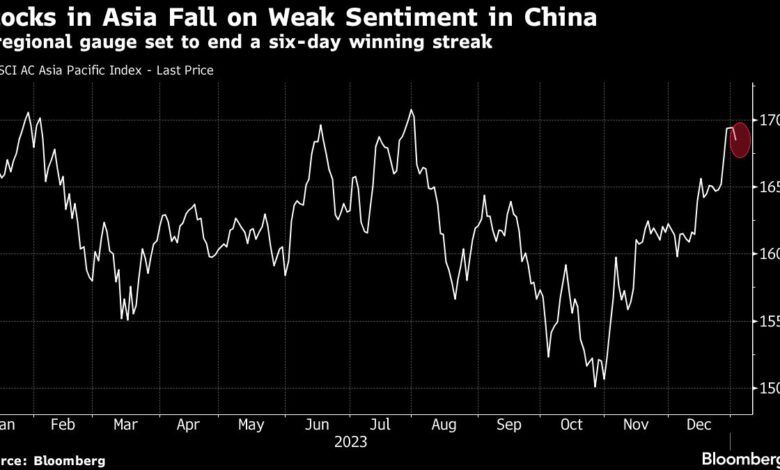
[ad_1]
(Bloomberg) — Chinese shares dragged down Asian equities on the first trading day of the year following weaker-than-expected factory data and a speech from President Xi Jinping that flagged the headwinds facing the economy.
Most Read from Bloomberg
Hong Kong’s benchmark share gauge slid as much as 1.5%, while its mainland and Taiwan peers also dropped. Sentiment was also dented after ASML Holding NV, which makes semiconductor manufacturing equipment, canceled shipments of some of its machines to China at the request of US President Joe Biden’s administration, according to people familiar with the matter.
Official data from China over the weekend showed factory activity shrank in December to the lowest level in six months, while a private gauge of the manufacturing activity released Tuesday showed a slight gain. President Xi in his annual new year address televised Sunday pledged to strengthen economic momentum and job creation, while conceding some “enterprises had a tough time” and “people had difficulty finding jobs and meeting basic needs.”
China’s economy may face another tough year in 2024, said Mark Matthews, head of Asia research at Julius Baer. “President Xi has made it very clear that on the economic front, his priority is bringing down the size of the property sector and its importance in the economy,” he said on Bloomberg Television. “That process is painful.”
Oil rose after Iran dispatched a warship to the Red Sea in response to the destruction of three Houthi boats by the US Navy over the weekend, a move that risks ratcheting up tensions and complicating Washington’s goal of securing a waterway that’s vital to global trade.
Futures contracts for US shares were little changed. The yen weakened against all its Group-of-10 peers in holiday-thinned trading as investors monitored conditions after an earthquake in Japan on Monday. The dollar was mixed. Ten-year Treasury futures dropped, while cash Treasuries are shut in Asia for a holiday in Japan.
Bitcoin surpassed $45,000 for the first time in nearly two years as anticipation of an approval of an exchange-traded fund investing directly in the biggest token intensified.
Back at the Start
Signs of exhaustion have emerged after a more than $8 trillion surge in the S&P 500 last year. Traders have looked past Federal Reserve uncertainty, recession angst and geopolitical risks. And many who came into 2023 dreading all that have ended up scrambling to chase the rally.
“The focus in 2024 shifts from 2023’s recession and inflation tail risks to degrees of normalization in growth, policy and cross-asset relationships,” Stuart Kaiser, US equity trading strategist head at Citi, wrote in a note. “We would be very cautious buying the first dip if that happens, but a more growth-concerned Fed may be quicker to come to the rescue than we expected just a month ago.”
A number of investors are now opting to take a cautious approach.
“We take a lot of solace in the fact that the Fed is done tightening without enough consideration for the level of interest rates that would’ve some rollover effect as we get in,” Vishnu Varathan, head of economics and strategy at Mizuho Bank, said on Bloomberg Television.
Key events this week:
-
Eurozone S&P Global Eurozone Manufacturing PMI, Tuesday
-
UK S&P Global UK Manufacturing PMI, Tuesday
-
Germany unemployment, Wednesday
-
US FOMC minutes, ISM Manufacturing, job openings, light vehicle sales, Wednesday
-
Richmond Fed President Tom Barkin — an FOMC voter in 2024 — speaks, Wednesday
-
China Caixin services PMI, Thursday
-
Eurozone S&P Global Eurozone Services PMI, Thursday
-
US initial jobless claims, ADP employment, Thursday
-
Eurozone CPI, PPI, Friday
-
US nonfarm payrolls/unemployment, factory orders, ISM services index, Friday
-
Richmond Fed President Tom Barkin — an FOMC voter in 2024 — speaks, Friday
Some of the main moves in markets:
Stocks
-
S&P 500 futures were little changed as of 11:19 a.m. Tokyo time. The S&P 500 fell 0.3% on Friday
-
Nasdaq 100 futures were little changed. The Nasdaq 100 fell 0.4%
-
Hong Kong’s Hang Seng Index fell 1.1%
-
China’s Shanghai Composite Index was little changed
-
Australia’s S&P/ASX 200 Index rose 0.2%
Currencies
-
The Bloomberg Dollar Spot Index rose 0.1%
-
The euro fell 0.1% to $1.1030
-
The Japanese yen fell 0.3% to 141.38 per dollar
-
The offshore yuan was little changed at 7.1272 per dollar
-
The Australian dollar was little changed at $0.6812
Cryptocurrencies
-
Bitcoin rose 3% to $44,941.11
-
Ether rose 1.7% to $2,378.39
Bonds
Commodities
-
West Texas Intermediate crude rose 1.2% to $72.53 a barrel
-
Spot gold rose 0.1% to $2,065.69 an ounce
This story was produced with the assistance of Bloomberg Automation.
–With assistance from Jason Scott and Isabelle Lee.
Most Read from Bloomberg Businessweek
©2024 Bloomberg L.P.
Source link




